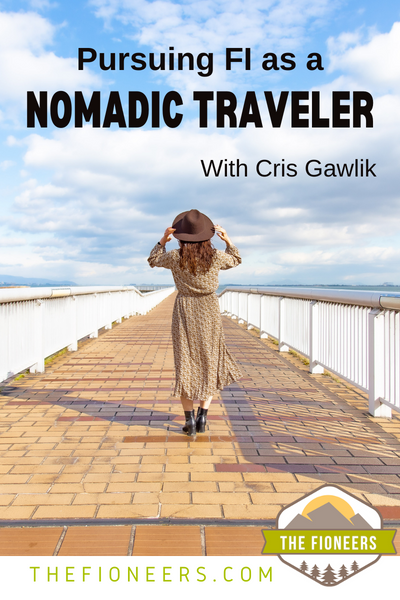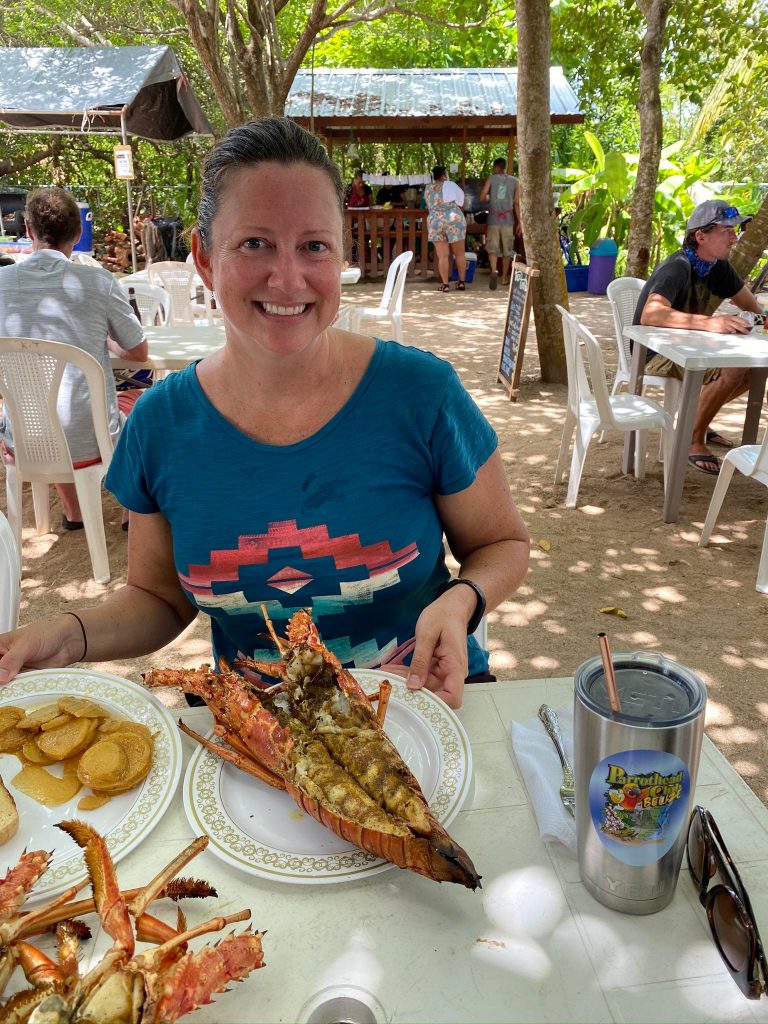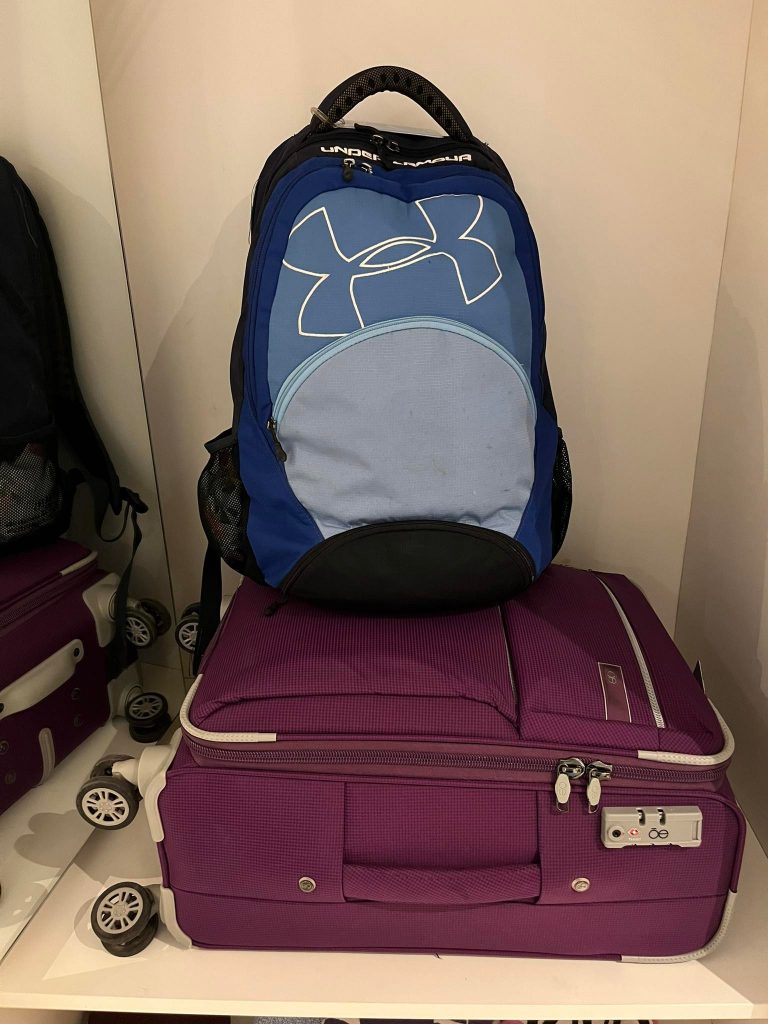
When asked why they are pursuing financial independence, so many people answer that they want to travel more. I am one of these people.
Some people want to travel nomadically all around the world while others want to keep a home base to travel from.
Many of these same people also believe that they need to reach financial independence and retire early before they can do these things. It’s time to bust this myth.
I’m excited to bring you this Slow FI interview with Cris Gawlik, who I met in the Slow FI Enthusiasts Facebook group. In 2019, Cris embraced her love of travel and embarked on a nomadic lifestyle. Not only did she not need to reach FIRE to do it, but it has actually benefitted her finances.
Let’s get into the interview!
1. Tell me a little bit about you.
I was born in Kansas, and I lived there until I turned 30. At that time, I started moving across the US for various careers. I enjoyed living in Texas, Illinois, Louisiana, and Arizona.
My career has been in Mathematics Education. I’ve worked as a high school Math Teacher, a university Math and Math Education Professor, a Curriculum Developer for a startup STEM business, and a Manager of Professional Development for a Math and Science Ed Tech Company.
In 2017, I started a freelancing business in my field. This has allowed me to easily provide content development and editorial services for Mathematics textbook publishers, tutoring centers, Ed Tech companies, etc.
After moving around so much, I realized how much I loved to travel. I started living abroad in 2019 at the age of 39. In the past 4 years, I’ve lived in 18 different countries. I can’t tell you my favorites! That feels like asking parents which one of their kids is their favorite. Here are just a few of the places I’ve lived: Antigua and Barbuda, Aruba, Barbados, Belize, Costa Rica, the Canary Islands, Greece, Italy, the United Arab Emirates, and more! It’s been a lot of fun!
2. You recently shared that you have built a life that you don’t want to retire from! Tell me more!
As a nomad, I travel the world full-time as a lifestyle choice. I love to learn and explore. Everything I own fits in a few small bags and goes with me everywhere.

On a day-to-day basis, I walk the community I’m in, shop at markets, cook, do laundry, chat with neighbors, and befriend store and restaurant owners. I sunbathe on the beach, snorkel in the sea, join local events, and take tours to learn about the history of the country I’m in.
I had already been moving almost every year since I graduated high school. I had lived in 18 homes across 5 states. By moving frequently in my early working years, I was able to climb the infamous career ladder. I gained valuable career experience, increased my income, and became an expert in my field.
This, later, led me to start my own small business in a very niche and lucrative market. My business is extremely flexible. I communicate with clients by email, and my projects are completely offline. This allows me to physically be anywhere in the world. Where I set my laptop has zero impact on getting the work done.
For these reasons, and more, I left the US and never turned back.
I move more frequently now because it’s easier, but I love getting a taste of each country before I head to the next.

By saving and investing, I built a solid cushion. I’ve been “coasting” (Coast FIRE) since February 2021. This means that I have enough invested already that will grow to provide me with a comfortable traditional retirement. All I need to do is cover my actual costs now.
It’s a freeing feeling not having to worry about the financial side of life. Don’t get me wrong, I still record every penny I spend. But, I know that I’m fine and can enjoy life on my own terms.
3. How has nomadic travel impacted your quality of life?
The flexibility in my lifestyle is very valuable to me. I only do things I want to do. And, I get to pass on opportunities that don’t excite me.
I love not being on an employer or manager’s schedule. With my clients, I tell them how long projects will take to complete. I will push back or reject projects if they try to force a short timeline, or it doesn’t work with my schedule. I find that, even if I turn down an opportunity and clearly state I’m not available or cannot meet their deadline, they continue to come back to me. Saying “no” and setting boundaries do not negatively impact my business.
Over time, I’ve also been able to build up a small and mighty team of contractors to do the majority of the work. Now, I negotiate the contracts and delegate most of the work. It’s safe to say that I work about 5 hours/month. This is so few hours that I feel retired already.
4. In your opinion, what things in your life contribute most to your happiness and contentment?
Keeping my goals in sight and going for them bring me a lot of happiness.
Over the last 18 months, I’ve had twenty friends pass away, due to cancer and COVID. The volume of loss in such a short period of time has been truly eye-opening. These friends were between the ages of 32 and late 70s. All were far too young to be taken from this world. I’ve come to a new understanding of how short life is, and I’m more motivated than ever to go after the life that I want.
5. How does nomadic travel impact your financial goals or timelines?
I have found a nomadic lifestyle to be significantly less expensive than a traditional one. I don’t have half of the expenses that most people have (i.e. rent or mortgage, a car payment, car insurance, clothes, household shopping, etc.).
Since I move frequently (and live out of a suitcase), I do not shop online and rarely purchase new items. Any time I choose to purchase something tangible, I must remove something from my bag to make space for it.
My nomadic lifestyle has also helped me become very intentional with every penny I spend. I’ve learned that I’d rather spend on experiences that build memories than on shiny new items that only bring temporary satisfaction. I’m also intentional about the experiences I choose. Before accepting invitations to enjoy events or outings with new friends, I ask myself if it’s something that I truly want to do, if it will make me happy, and provide a memory I will cherish. If all three of those boxes aren’t checked, I politely decline.

Living as a nomadic traveler is a form of geoarbitrage. Geoarbitrage means that someone earns income in a stronger currency and lives in an area where their income goes further. By spending more time in lower-cost-of-living countries while growing my business, I was able to increase my savings rate without lowering my quality of life. This allowed me to reach Coast FI more quickly and will allow me to live off my investments in the future when I no longer want to work.
Now, I travel to both expensive and lower-cost countries to balance out my spending. Even so, I spend significantly less than in my previous lifestyle.
Lastly, because I stay outside of the US for more than 330 days each year, I also take advantage of the FEIE tax exclusion. This means that I don’t pay income taxes unless I make more than $112,000 in a year. This tax exclusion helped me reach Coast FI faster and transition into working less.
Overall, embracing a nomadic lifestyle has improved my finances and helped me reach my goals faster.
6. What enabled you to live a nomadic lifestyle?
There were a few key things that have enabled me to live a digital nomad lifestyle.
- I built up the skills needed to build a business that I could run from anywhere.
- I am a minimalist, so I have fewer things and spend less money.
- I became connected to the digital nomad and FIRE communities which inspired me to make this vision a reality.
Beyond this, I have an innate desire to try new things, and I’m not scared to try them.
I have been asked, “Have you always been this fearless?”
To be honest, I’ve never really thought of myself as fearless, but I can see how others would see me in that way. Instead, I believe that I’ve always been a great problem-solver. It’s completely normal for me to take in information, reason through it, apply different strategies, and work through problems in different ways.
So many people shy away from traveling solo. I’m a very independent person and was from a young age. I had my first solo flying experience when I was 12 when I flew from Kansas City to Dallas to stay with a friend and her family for much of the summer. While there, I also attended a 2-week summer camp and made a bunch of great friends from all over Texas. Every summer after that, I was excited to return and see those special friends. By the time I was 14, I was staying for a month at camp. By the age of 16, I was driving from Kansas to Texas every summer to work at the camp.
This gave me experiences of traveling independently. And, by the age of 22, I started vacationing around the US by myself. I wanted to enjoy different parts of the country, and I was tired of waiting on people to have the time and money to do so with me.
Ultimately, I don’t consider myself fearless. I think I am a great problem solver. I have goals that I’m willing to accomplish solo or with the good company of others.
7. What adjustments did you need to make in your life after becoming a digital nomad?
My biggest adjustment was downsizing everything I own into a few bags. To be honest, though, it was easier than I expected. Previously, I had been traveling with one checked suitcase, one carry-on roller suitcase, and a small daypack.
It has taken over three years to finally downsize to a carry-on and a daypack. The mental hurdles for parting ways with those last few items were challenging though.

I realized that I can easily buy certain things anywhere I go like common toiletries, personal hygiene items, black leggings, winter pajamas, or an umbrella. Since I chase warm weather, I’ve reduced the number of clothes I was lugging around for the few times I was in cold weather. I also usually rent apartments with laundry facilities, and I enjoy washing clothes every 3-4 days. These things helped me let go of so many extra items that were unnecessary and now allow me to travel with a carry-on and day-pack only.
8. How did your pursuit of FI help or hinder your decision to live a nomadic lifestyle?
I learned about FI from the Choose FI group, and then, I started finding other FIRE-related groups. This motivated me to read the recommended books, listen to podcasts, and participate in group discussions.
At the same time, I also joined a bunch of groups focused on the digital nomad lifestyle.
Marrying the information from both communities created my lightbulb moment. Traveling full-time would allow me to explore the world while reducing my expenses. It just made sense.
9. Why and when do you think someone might consider “downshifting?”
When people reach Coast FI, they could consider downshifting. They can use the Coast FI formula to help them figure out if they’ve reached this point.
CoastFI # = FI # / (1 + Expected Growth Rate)^(# of years until desired retirement)
Once I reached my Coast FI number, it gave me the confidence to change my position in my business. I stopped taking on projects myself and started having contractors do most of the work. This allows me to work only a few hours a month and still earn more than my annual expenses.
Reaching Coast FI gives me the confidence that I no longer need to focus on wealth accumulation. My investments will grow naturally in the market.
10. What advice do you have for someone considering a similar decision?
I’d love to see everyone ask themselves, “What are my goals and why do I have them?”
I’ve found that most people don’t know their “why” or the purpose for most of what they choose to do in life. They go through the motions and follow society’s script for success instead of really understanding what makes them happy and why.
Once you start making intentional decisions, a happier life will follow.
Thank you so much, Cris, for sharing your story with us!
There are so many things that I love about this interview. First, I’m always surprised when I hear that a nomadic travel lifestyle can actually be cheaper than a traditional lifestyle. I always think of travel as being expensive. But, nomadic travel allows you to reduce your costs on two of the largest expenses – housing and a personal vehicle.
Additionally, when traveling with a suitcase and a day-pack, Cris rarely buys new things. Instead, she spends money intentionally on experiences.
Lastly, she can utilize geoarbitrage. This means that she’s earning money in a currency that’s stronger than the place where she’s chosen to live. By choosing to live in some lower-cost of living countries, she can get a lot more for her money.
Ok, that’s great and all… but you might be wondering, “What if I still need to generate income? How can I do that while living nomadically?”
If you want to live a nomadic lifestyle (or simply travel more), you don’t need to retire early!
You need either:
- A remote job
- A business that you can run from anywhere in the world
Usually, I say that all you need is an internet connection. But, that’s not necessarily true, as shown by Cris’ situation. Over time, she built her skills and then built up a business that she doesn’t even need a steady internet connection to run!
It will take time and effort to build up a career or business that could allow a nomadic or location-independent lifestyle, but it’s certainly possible. Cris is an excellent example of this.

If you’d like to learn more about Cris, you can find her in the following places:
- Facebook: A Suitcase and Smile
- Personal Blog: A Suitcase and a Smile

























I’ve enjoyed following Cris on her adventures via Facebook and it’s great to hear more about her journey. If she feels comfortable sharing, I’d love to know the breakdown of her average expenses for a year during her nomadic lifestyle. She mentions her costs are much less than they were before going nomadic but it would be awesome to know just how much they are vs what they were.
What a great interview! Cris, your life sounds so exciting.
One thing I will caution you about: based on my reading of your interview, you may not qualify for the Foreign Earned Income Exclusion. Staying out of the US for 330 days is only one part of the equation. 🙂 Obviously, I don’t know your full situation, but as a CPA, I would advise you to tread very, very carefully here. I’d hate for there to be a misunderstanding and you end up owing the IRS a ton in penalties and back taxes!
You go Cris! Hearing about the 20 people you know who have passed in the last few years is a sobering thought, that alone would be motivation enough to live life on your terms. Congrats for sticking with it, I’ll bet you’ve seen some wonderful places. Thanks for sharing!